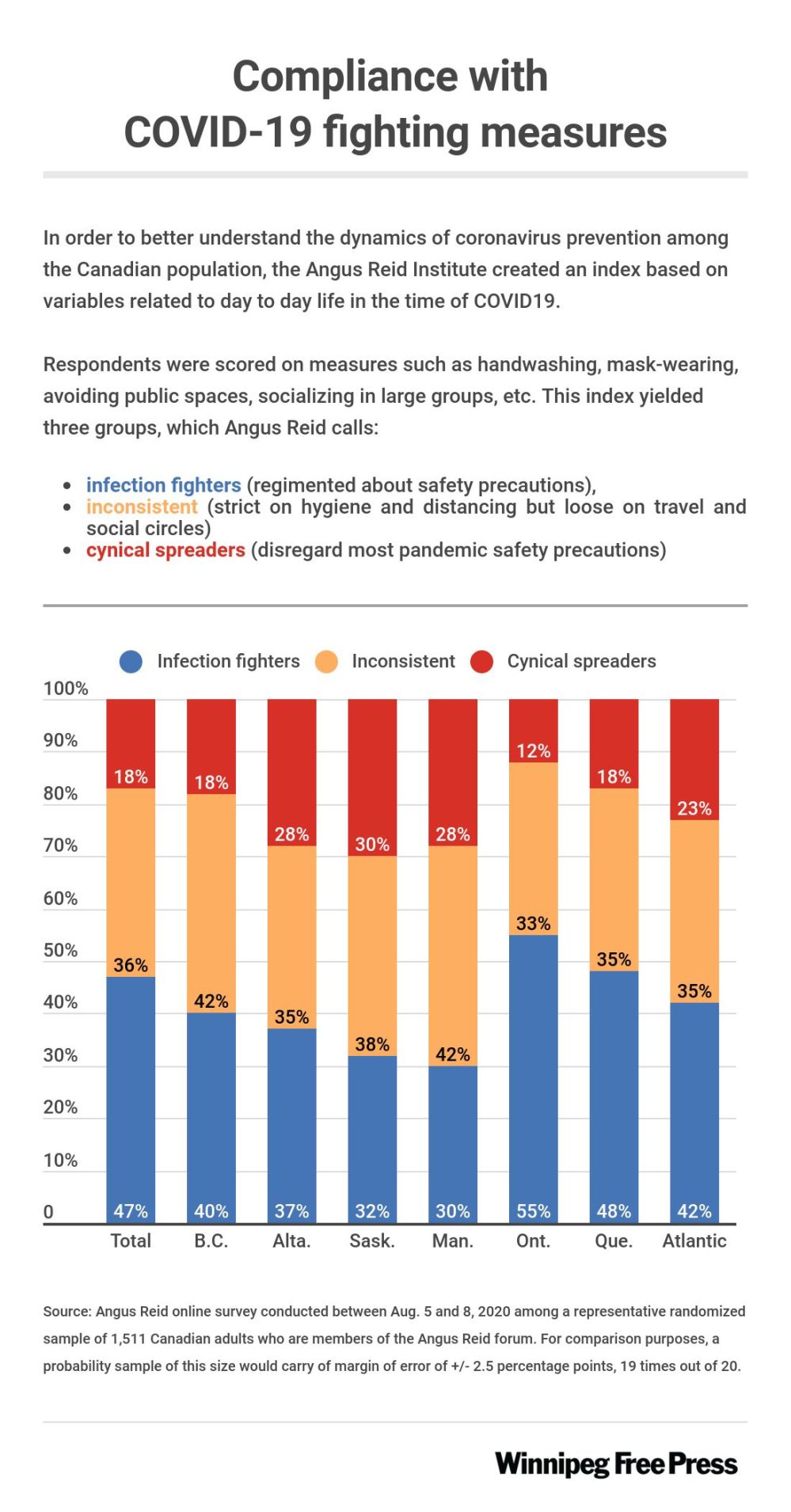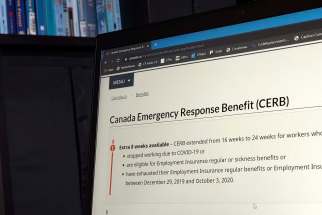Manitobans flouting pandemic precautions: poll Nearly 1 in 3 surveyed not adhering to any guidelines
Read this article for free:
or
Already have an account? Log in here »
To continue reading, please subscribe:
Monthly Digital Subscription
$0 for the first 4 weeks*
- Enjoy unlimited reading on winnipegfreepress.com
- Read the E-Edition, our digital replica newspaper
- Access News Break, our award-winning app
- Play interactive puzzles
*No charge for 4 weeks then price increases to the regular rate of $19.00 plus GST every four weeks. Offer available to new and qualified returning subscribers only. Cancel any time.
Monthly Digital Subscription
$4.75/week*
- Enjoy unlimited reading on winnipegfreepress.com
- Read the E-Edition, our digital replica newspaper
- Access News Break, our award-winning app
- Play interactive puzzles
*Billed as $19 plus GST every four weeks. Cancel any time.
To continue reading, please subscribe:
Add Free Press access to your Brandon Sun subscription for only an additional
$1 for the first 4 weeks*
*Your next subscription payment will increase by $1.00 and you will be charged $16.99 plus GST for four weeks. After four weeks, your payment will increase to $23.99 plus GST every four weeks.
Read unlimited articles for free today:
or
Already have an account? Log in here »
Hey there, time traveller!
This article was published 17/08/2020 (1939 days ago), so information in it may no longer be current.
Manitobans fall behind most other Canadians when it comes to keeping up with COVID-19 precautions, according to a national survey.
The Angus Reid Institute surveyed over 1,500 Canadians, nearly half of whom say they are following all recommendations put forward — from handwashing to only visiting public spaces if necessary — but the survey also found that Manitoba isn’t following this trend.
“Troublingly, at the other end of the extreme, you’ve got one in five (in Canada) — and that’s higher in Manitoba — who are really almost actively working against those infection fighters,” Angus Reid executive director Shachi Kurl said.
Nearly one in three Manitobans has flouted safety guidelines entirely – the national average is one in five — making Manitoba the second-worst in the country, beaten only by Saskatchewan and tied with Alberta.
People in this group, referred to by surveyors as “cynical spreaders,” are more likely to say current restrictions have gone too far, don’t wear masks in public or privately, and disregard most if not all safety precautions. The survey also collected data from groups they call “infection fighters,” who follow all recommendations, and “inconsistent” fighters, who are more strict on hygiene restrictions but may be more lax on other rules. Manitoba tied with British Columbia for having the most people in the “inconsistent” group in the country, at 42 per cent of those surveyed in those provinces.
Kurl suggested Manitoba’s propensity for poor COVID-19 etiquette may be caused by the “rural-urban divide” in the province compared to other provinces, and the fact that positive numbers remained relatively low compared to much of the country when closures were taking place.
“There have been some localized outbreaks in Saskatchewan and Manitoba and Alberta, I’m certainly not suggesting those places have not had instances with COVID, but I think the perception there is that these have not been hot spots, there hasn’t been widespread community transmission,” she said.
“And you combine that with the fact that in these rural communities, life hasn’t changed day-to-day the way it has in the big cities.”
Significant factors in the data also included age – younger people are less likely to follow precautions closely – and level of education, which suggested university-educated Canadians are some of the strictest followers of safe habits.
Political affiliation delineated the divide between those following and forgoing guidelines. Those who voted for the federal Conservative party were nearly four times more likely to be in the “cynical spreaders” group. University of Winnipeg associate psychology professor Dr. Justin Friesen suggested this data could come from the “party over policy effect,” a reflective dislike of policy some groups believe comes from voters or officials outside their political beliefs, resulting in data that show communities with higher populations of Conservative voters may respond poorly to ideas which they believe come from a Liberal federal government.
“We see it worse in the United States, when you see the politicization of health issues – where it doesn’t just become a matter of public health, but rather a reflection of which political parties we belong to and our sense of political identity – when that happens, all sorts of psychological defence mechanisms kick in,” he said.
Friesen commended the messaging being sent out by public health professionals in the province, but suggested people are influenced by descriptive norms more than injunctive norms – the idea that people will catch on to certain habits more quickly if they see them in their communities than if they are told it is expected of them by officials.
“Even if you hear you should be doing this or that, if you look around and observe the people in your social circle are doing something very different, we follow that sort of behaviour instead,” he said.
malak.abas@freepress.mb.ca
Twitter: malakabas_

Our newsroom depends on a growing audience of readers to power our journalism. If you are not a paid reader, please consider becoming a subscriber.
Our newsroom depends on its audience of readers to power our journalism. Thank you for your support.








